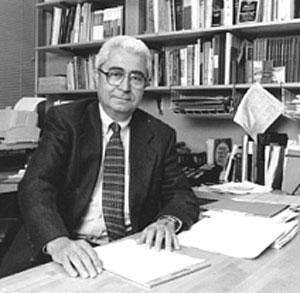Public Health in Time of War (web article)

When Beirut was under siege in 1982, Haroutune Armenian, MD, DrPH, happened to be dean of the Faculty of Health Sciences at the American University of Beirut. The faculty were locked in their apartments much of the time, only going to their offices when there was a lull in the fighting.
Armenian spoke August 2 at the Johns Hopkins Bloomberg School of Public Health about performing public health work in wartime. He said that, despite the siege, faculty and students were able to fan out across the city and conduct a residential morbidity survey among 3,000 Beirut families, as well as establish a surveillance program of health care facilities.
The data revealed that although no major epidemics were in progress, diarrhea and respiratory infections were elevated among refugee groups. "And," said Armenian, a professor of Epidemiology, "mental health problems were rampant"—a fact that convinced him that health workers responding to a disaster should be trained in the fundamentals of psychological counseling. (He went on to do a seminal epidemiologic investigation of the aftermath and casualties of Armenia’s massive 1988 Leninakan Earthquake.)
Other epidemiologic studies also revealed that the risk of coronary artery disease was directly correlated with the number of war stressors a person suffered—including the loss of a loved one, a house, a job. Even the number of times a person had to cross certain boundary lines in Beirut each week, he said, was related to the incidence of coronary artery disease.
Carrying out the public health survey in the midst of a siege drove home to Armenian that "people can turn a moment of adversity into positive achievement." In time, this glass-half-full outlook would spawn another rock-solid belief: "When everything else is lost, you have no right to lose hope. You have to keep hope." In this vein, Armenian insisted that despite the current conflict in Lebanon, that country would become “ten times better.”
Nations enter into war because they believe the fighting is going to effect beneficial changes, said Armenian, and yet the fruits of those wars are typically bitter. "We speak little about the many wars that lead to political immobility and loss of life but to no effective change," he said.
Armenian pointed out that today’s endemic and undeclared wars have all emerged out of hopelessly deadlocked political stalemates. "There are no quick solutions [to endemic war] because the web of causation is so complex, and so a certain level of violence becomes the norm."
When it comes to working toward peace and positive change, Armenian said, he would opt every time for the stone-age approach—talk, discussion and dialogue—rather than for the high-tech implements of war. In his opinion, the one thing war does well is to destroy human dignity. "Dignity is the basis of health," he said, "and so helping individuals achieve a reasonable level of dignity is a public health function." —Rod Graham
Public Affairs media contacts for the Johns Hopkins Bloomberg School of Public Health: Kenna Lowe or Tim Parsons at 410-955-6878 or paffairs@jhsph.edu.